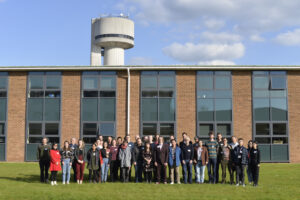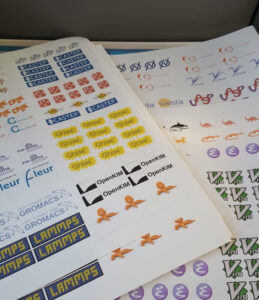The workshop “Open Science with the Atomic Simulation Environment” was held at Daresbury Laboratory, UK, from April 24-28 2023. (Conference website)
The event consisted of scientific talks and posters, followed by parallel tutorial and “hackathon” sessions. Chemistry and physics research were presented that develop and apply atomistic methods with an emphasis on automation, interoperability and reusability.

Sponsors
This event was primarily funded by CECAM (through the Flagship Workshop programme) and Psi-k, with additional funding from CCP5, CCP9, ALC and PSDI
Overview
The Atomic Simulation Environment (ASE) is a community-driven Python package that integrates with more than 30 atomistic codes and solves the “n2 problem” by providing some standard data structures and interfaces to ~100 file formats, acting as useful “glue” for work with multiple packages. New methods such as preconditioned optimisers are written once and immediately available to users of established atomistic codes. Developers of new calculation packages using ASE have been able to focus on novel aspects (e.g. workflow management, machine-learning interatomic potentials, and global structure optimisation).
Workshop participants ranged from ASE founders to active developers to novices. Atomistic codes were featured covering methods including classical interatomic potentials; machine-learned potentials; plane-wave density-functional theory (DFT); linear-scaling DFT. While plane-wave DFT is a prominent workhorse, it is clear that this community is not overly attached to one Hamiltonian calculator and there is much work to discuss that crosses interfaces between packages. To encourage networking within and across code silos, we provided stickers for attendees to wear, representing codes they are familiar with or keen to discuss: 88 stickers were taken, covering 24 software packages!

Themes of the workshop that were addressed in talks included workflow management (with Atomic Simulation Recipes and AiiDa / aiida-atoms), reproducing published methods (forcefields [OpenKIM] and structure prediction [AGOX]), and structure optimisation (including AGOX, Ghost-BEACON and adaptive force convergence).
A new set of introductory ASE tutorials was created by the workshop organisers, using Software Carpentry principles and web templates. Additional tutorials were contributed for the AbTEM and ACAT packages, and the Open Science case-studies exercise was delivered by an expert from outside the materials science community. While not part of the tutorial program, we should also draw a connection to the invited talks on OpenKIM and KLIFF which included substantial “live-coding” demonstrations!
Several code developments took place as a result of the workshop: during planning and development of the core tutorials, bugs were identified and code merged into ASE. At least 7 other “Issues” and “Merge Requests” were created at the workshop, including a new plugin system for visualisation, refactoring of geometry optimisers, improved Windows testing and investigation of some scaling issues.
Invited speakers
- Kristian Thygesen (Technical University of Denmark (DTU))
- Ilia Nikiforov (University of Minnesota, USA)
- Laura Ratcliff (University of Bristol, UK)
- Karsten Wedel Jacobsen (Technical University of Denmark (DTU))
- Paul Erhart (Chalmers University of Technology, Sweden)
- Yo Yehudi (Open Life Science, UK)
- Amit Gupta (University of Minnesota, USA)
Organising Committee
- Adam Jackson (Science and Technology Facilities Council, UK)
- Alin Elena (Science and Technology Facilities Council, UK)
- Lucy Whalley (University of Northumbria, UK)
- Pietro Delugas (International School for Advanced Studies, Italy (SISSA))
- Ask Larsen (Technical University of Denmark (DTU))
Detailed Program
Monday 24 April
Science programme
| 12:00 – 13:00 | Registration & Lunch |
| 13:00 – 13:10 | Welcome & Introduction (Alin Elena) |
| 13:10 – 14:10 | I1 (remote) Kristian Thygesen (DTU) “Atomic Simulation Recipes: An Open Python framework for FAIR and scalable workflows” |
| 14:10 – 14:30 | C1 Bonan Zhu (University College London) “Preserving provenance of scientific workflows for material modelling” |
| 14:30 – 15:00 | Coffee |
| 15:00 – 16:00 | I2 Ilia Nikiforov (University of Minnesota) “The OpenKIM potential repository and testing framework: overview and demonstration” |
| 16:00 – 16:20 | C2 Mads-Peter Christiansen (Aarhus University) “AGOX: Modular code for global optimization of atomistic structures in the machine learning era” |
| 16:20 – 16:40 | C3 Toma Susi (University of Vienna) “abTEM code: transmission electron microscopy from first principles” |
| 16:40 – 17:00 | C4 Ana Carolina Coutinho Dutra (Newcastle University) “Defect Chemistry and Ion Transport in Low-Dimensional-Networked Li-Rich Anti-Perovskites as Solid Electrolytes for Solid-State Batteries” |
| 17:00 – 19:00 | Poster session & aperitif |
Tuesday 25 April
Science programme
| 09:30 – 10:30 | I3 Laura Ratcliff (University of Bristol) “New Opportunities for First Principles Simulations of Thousands of Atoms Using Linear Scaling Density Functional Theory” |
| 10:30 – 11:00 | Coffee |
| 11:00 – 12:00 | I4 Karsten Wedel Jacobsen (DTU) “Getting around barriers in atomic structure optimization” |
| 12:00 – 12:20 | C5 Bo Peng (University of Cambridge) “Tunable photostriction of halide perovskites through energy dependent photoexcitation” |
| 12:20 – 14:00 | Lunch |
| 14:00 – 15:00 | I5 Paul Erhart (Chalmers University of Technology) “Tools for modelling the dynamics of materials – dynasors and salamanders” |
| 15:00 – 15:20 | C7 Xue Yong (University of Sheffield) “Computational design of electrocatalyst for energies” |
| 15:20 – 15:50 | Coffee |
| 15:50 – 16:50 | I6 (remote) Yo Yehudi (Open Life Science) Building Open Science Communities |
| 16:50 – 17:10 | R1 (remote) Anubhab Haldar (Boston University) “Adaptive force convergence in GPAW: Implementation, results and outlook” |
| 17:10 – 17:30 | R2 (remote) Michael Waters (Northwestern University) “Building Workflows with ASE for Research and Visualization” |
| 18:00 – 20:00 | Dinner |
Wednesday 26 April
Science programme
| 09:30 – 10:30 | I7 Amit Gupta (University of Minnesota) “Machine Learning Interatomic Potentials in OpenKIM: Development, Deployment and Validation of MLIP using KLIFF” |
| 10:30 – 11:00 | Discussion session |
| 11:00 – 11:30 | Coffee |
Parallel sessions
For Tutorials T1-T4, the tutors were Lucy Whalley, Pietro Delugas, Adam Jackson and Alin Elena. The hackathon was led by Ask Larsen.
| TUTORIALS | HACKATHON | |
| 11:30 – 12:30 | T1: Basics (Atoms and Calculators) I | Ask Larsen: hackathon kick-off and group formation |
| 12:30 – 13:30 | Lunch | Lunch |
| 13:30 – 15:00 | TC1: Toma Susi “AbTEM” | Hacking |
| 15:00 – 15:30 | Coffee | Coffee |
| 15:30 – 17:00 | T2: Basics (Atoms and Calculators) II | Hacking |
Thursday 27 April
Parallel sessions
| Tutorials | Hackathon | |
|---|---|---|
| 09:30 – 11:00 | TC2: Steen Lysgard “ACAT” | Hacking |
| 11:00 – 11:30 | Coffee | Coffee |
| 11:30 – 12:30 | T3: Properties | Hacking |
| 12:30 – 14:00 | Lunch | Lunch |
| 14:00 – 15:00 | T4: Dynamics | Hacking |
| 15:00 – 15:30 | Coffee | Coffee |
| 15:30 – 17:15 | TC3: Malvika Sharan “Open Science” | Hacking |
Friday 28 April
Parallel sessions
| Tutorials | Hackathon | |
|---|---|---|
| 09:30 – 11:00 | T5: Atomic Simulation Recipes (Ask Larsen) | Hacking |
| 11:00 – 11:30 | Coffee | Coffee |
| 11:30 – 12:30 | Bring Your Own Problem (help available from tutors) | Wrap-up session |
| 12:30 – 14:00 | Lunch | |
| 14:00 | Departure |
